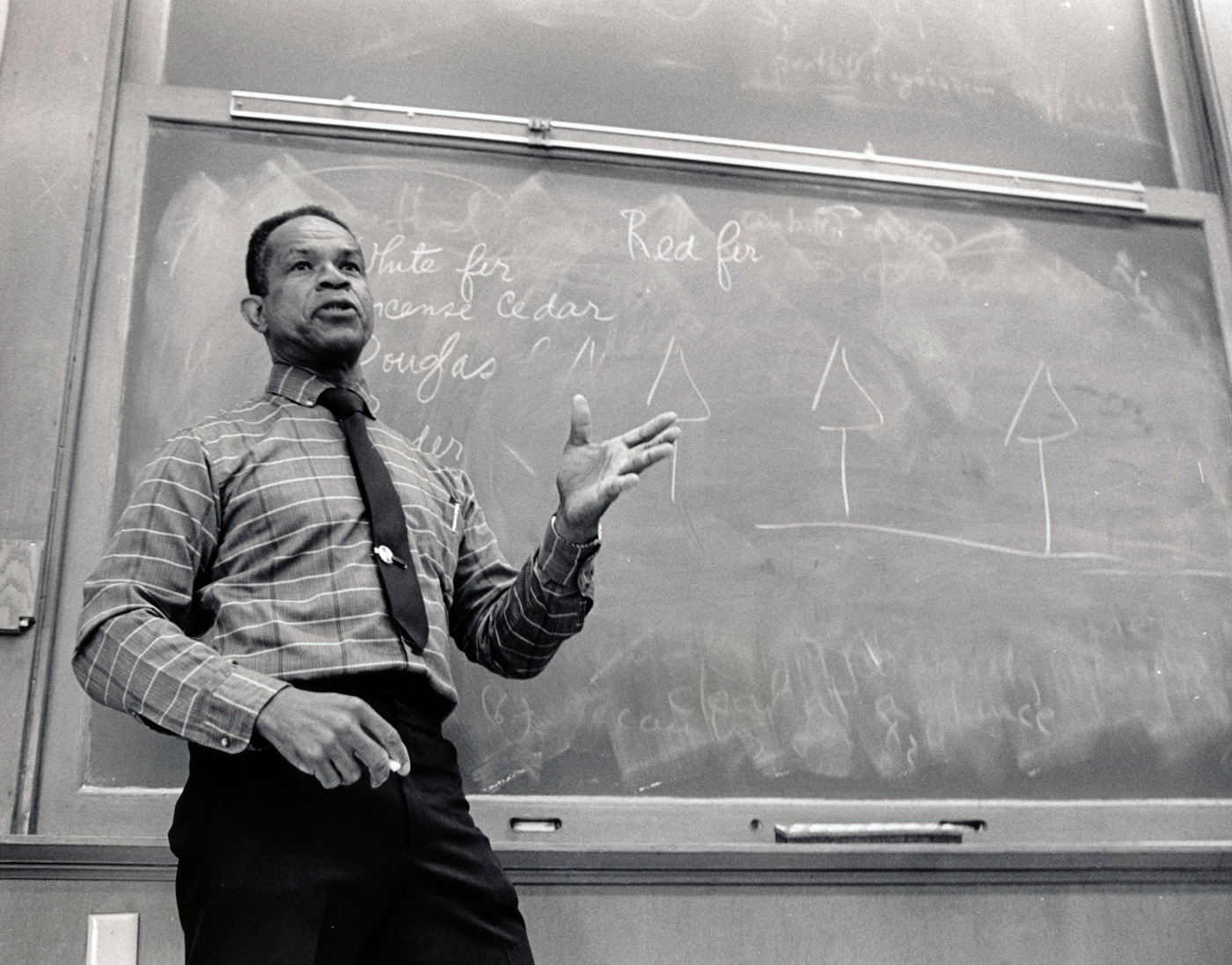
Carroll Williams lectures in this undated archival photo.
Carroll B. Williams, Jr., a former senior lecturer in the Department of Environmental Science, Policy, and Management (ESPM) who lived a life full of firsts, passed away on March 1, 2024. He was 94.
Williams was born on September 24, 1929, in St. Louis and grew up during the Great Depression. He lived with family in Leavenworth, Kansas, before moving to Chicago where his father ran a popular neighborhood pharmacy.
Williams planned to attend the School of Natural Resources at the University of Michigan in 1950, but his studies were ultimately interrupted by the Korean War. He volunteered to serve in the United States Marine Corps from 1950 to 1953, where he became one of the first Black soldiers to serve in an integrated unit and fought in the Battle for Outpost Vegas. Williams left the Marine Corps with the rank of Staff Sergeant following the war and returned to Michigan under the G.I Bill.
In 1955, Williams completed his BS in forestry and became the first Black student to graduate from Michigan’s School of Natural Resources (now the School for Environment and Sustainability). He accepted a position with the U.S. Forest Service in Oregon and continued his forestry education at Michigan, earning a Master of Forestry in 1957 and PhD in forestry—with an emphasis in entomology and statistics—in 1963. Williams became not only the first Black American to earn a PhD in forestry in the United States but also the first Black forester with a doctorate to work for the Forest Service.
Since 1961, Williams worked as a forester and entomologist at various Forest Service research stations across the U.S., including the Pacific Southwest Research Station in Albany, California. He was largely regarded as an expert in large-scale chemical control operations and large-scale pilot tests and frequently served as a consultant or technical advisor to these operations. In 1968, the Forest Service assigned Williams to New Haven, Connecticut to study the invasive bark beetle; he joined the faculty at Yale School of Forestry during that time, serving as a lecturer in forest entomology from 1969 to 1972.
Williams returned to the Berkeley area in 1972 and began designing and conducting field tests of experimental insecticides against forest-defoliating insects. In 1975, the Forest Service named him a Pioneering Scientist and tasked him with leading the application of integrated pest management principles in forest systems. He led the project until his retirement from the Forest Service in 1988.
After retiring, Williams was appointed a senior lecturer in the Department of Forestry and Range Management (which was later reorganized into ESPM). He was among the first Black forestry faculty members at UC Berkeley and regularly taught courses in forest and wildland resource conservation, forest health, silviculture, and forest entomology. He served as the associate dean for Professional Degree Programs in the College of Natural Resources from 1995 to 1998; was active in recruitment, admissions, and mentorship committees and programs; and led efforts to redevelop Mulford Hall’s forestry library into a Student Resource Center. He retired from the College in 2003.
Williams is survived by his children, Robin, Maiya, and Blake; son-in-law, Patric; stepchildren, Malana, Rasaan, and Irene; grandchildren, Ripley, Patric, Deckard, Marianne (Mars), Neo, Teddy, James, and Camille; and three ex-wives.
Read More
- Obituary: Carroll B. Williams, Jr. (San Francisco Chronicle)
- Remembering Carroll B. Williams, Jr., pioneering environmental scientist (Berkeleyside)
- Announcing the Dr. Carroll B. Williams Fund for Black Excellence (University of Michigan)
